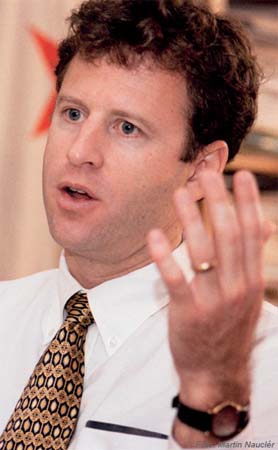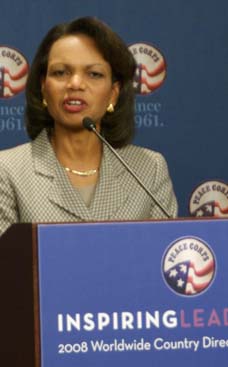
"The most important area of strain on the military is on its personnel. While there are equipment shortages and maintenance depot queues of equipment due to the ongoing wars, Congress has been generous enough with supplemental appropriations that these situations are not dire. And while normal training patterns for soldiers and Marines have been badly disrupted by Iraq and Afghanistan, there can be little doubt that the overall battle toughness of these forces is robust." Michael O'Hanlon, a Senior Fellow at the Brookings Institute and a Visiting Lecturer at Princeton University, served as a Peace Corps Volunteer in Congo Kinshasa.
Michael O'Hanlon writes: Our Military is Holding up reasonably well under Immense Strain
Military check-up time
Sunday, May 4, 2008
How well are our armed forces, and particularly our ground forces, holding up under the remarkable strain of the Iraq and Afghanistan wars?
As a nation, never have we asked so much of so few for so long. As such, the strain on soldiers and Marines must be constantly tracked as we reach decisions about how long to sustain 15 brigades in Iraq (once we draw down to that number this summer), how much to increase our forces in Afghanistan (now that Defense Secretary Robert Gates has promised U.S. allies that the next American administration will do so), and how much faster we should increase the size of our Army and Marine Corps (if that is even possible).
In fact, to date, our military is holding up reasonably well under the immense strain. By most measures of quality, it still looks roughly comparable to say the early years of the Reagan buildup — if not necessarily as strong as its typical state of the late Reagan years or the 1990s.
Of course, there have been huge individual sacrifices, and for many soldiers and Marines and their families, things are not good at all. We owe these people more than we can every say, more than we can ever repay. But at a strategic level, the state of the force is not so bad as to necessitate an immediate change in our approaches to fighting wars.
The most important area of strain on the military is on its personnel. While there are equipment shortages and maintenance depot queues of equipment due to the ongoing wars, Congress has been generous enough with supplemental appropriations that these situations are not dire. And while normal training patterns for soldiers and Marines have been badly disrupted by Iraq and Afghanistan, there can be little doubt that the overall battle toughness of these forces is robust.
But how well are people holding up? Key measures of personnel readiness include the experience and aptitude of typical troops, the availability of individuals with critical specialized skills, and the ability of the military to recruit new members and retain those already in.
One recent worry relates to a lowering of personnel standards. For example, the military has accepted more recruits with general equivalency degrees rather than high-school diplomas; it has enlisted a higher percentage of applicants scoring very low on its aptitude tests; and it has also taken on more individuals over 40 years old as first-time military personnel.
For the most part, however, these are not huge problems at present. The G.E.D. is considered academically equivalent to a high-school diploma, and certainly the military can ensure that anyone with such qualifications is up to par by testing them in other ways too. As of 2005, moreover, 90 percent of recruits continued to have high-school diplomas, comparable to the 1985 figure at the height of the Reagan buildup. And the typical recruit scored better on the Armed Forces Qualification Test (AFQT) in 2005 than in 1985.
That said, while figures for the other services have remained good, the Army has had some worsening problems of late, with the high-school graduation figure for 2007 declining to just over 70 percent of new recruits — comparable to the norm of the 1970s. That suggests a trendline that needs to be arrested and reversed, even if overall statistics on the quality of new recruits are reasonably solid.
Moral waivers for new recruits for their criminal histories have increased substantially in recent years. A total of 860 soldiers and Marines required waivers from convictions for felony crimes in 2007, up by 400 from 2006.
While most of the convictions were for juvenile theft, and the aggregate total is modest compared with the size of the force, only by arresting such trends will the quality of the force be ensured. Again, the current situation is not that dire, but the trendlines are worrisome and must be watched.
So much for finding new soldiers and Marines; what about holding on to those we already have? There has been a recent rumor that West Point graduates have been leaving the service at drastically increased rates as soon as their minimal obligations are satisfied.
In fact, this appears not to be true. The last year for which data are available as of this writing (the class of 2002, which was eligible to leave the service as of 2007), showed a 68 percent re-enlistment rate, only 4 percentage points below the 1990s average.
More generally, company grade officers (first and second lieutenants as well as captains, and West Point grads and others all combined) have not been leaving the force at a greater than normal rate.
The average attrition rate during the Iraq war has been less than the average rate of the late 1990s, for example. A similar conclusion is true of majors.
Nonetheless, there is a problem: The Army is now short several thousand officers in aggregate. The reason is not what one might think. As noted, officers are not quitting in droves. Rather, the Army is trying to increase the number of its officers as it enlarges the number of brigades in its active-duty force by at least 25 percent.
In addition, the Army did not enlist enough young officers in the early 1990s, meaning the current pool of officers from which to recruit for mid-level positions is too small.
How about the general morale of the force? One way to assess this is to look at those having serious problems in their lives. Soldiers and Marines' divorce rates have leveled off somewhat at about 3.5 percent, after reaching 3.9 percent in 2004, and are not worse than in the general population — but still above the 2.9 percent of 2003.
Suicide rates reached 17.3 per 100,000 soldiers in the U.S. Army in 2006, not far off from the age-adjusted and gender-adjusted average for the U.S. population on the whole (for males, for example, the rate is 17.6 per 100,000), but still much higher than the rate of 9.1 per 100,000 soldiers in 2001.
Most of all, many soldiers and Marines face huge personal challenges and often tragedy, in part due to the strain of the wars. These trends area serious reason for worry. But as noted, they are not totally out of the norm of historical experience either.
For one group of soldiers surveyed in 2008, among those who had been to Iraq on three or four separate tours, the fraction displaying signs of post-traumatic stress disorders was 27 percent (in contrast to 12 percent after one tour and 18.5 percent after two).
As of early 2008, among the 513,000 active-duty soldiers who have served in Iraq, more than 197,000 had served more than once, and more than 53,000 had deployed three or more times. That means almost 15,000 people have faced PTSD after a third or fourth tour. We must of course do everything possible to help these individuals.
As we near Memorial Day, the above statistics should not only cause us considerable concern at a policy level, they should of course further reinforce our desire and commitment to honor those who serve our nation in uniform, now and in the past.
Thankfully, however, they do not add up to a broken force or a military on the verge of collapse. We should not continue to deploy them lightly at the pace of the recent past.
But the picture that emerges from the above information is that our soldiers and Marines are continuing to find it within themselves to do the near-impossible to protect the country.
Michael O'Hanlon is a senior fellow at the Brookings Institution.









